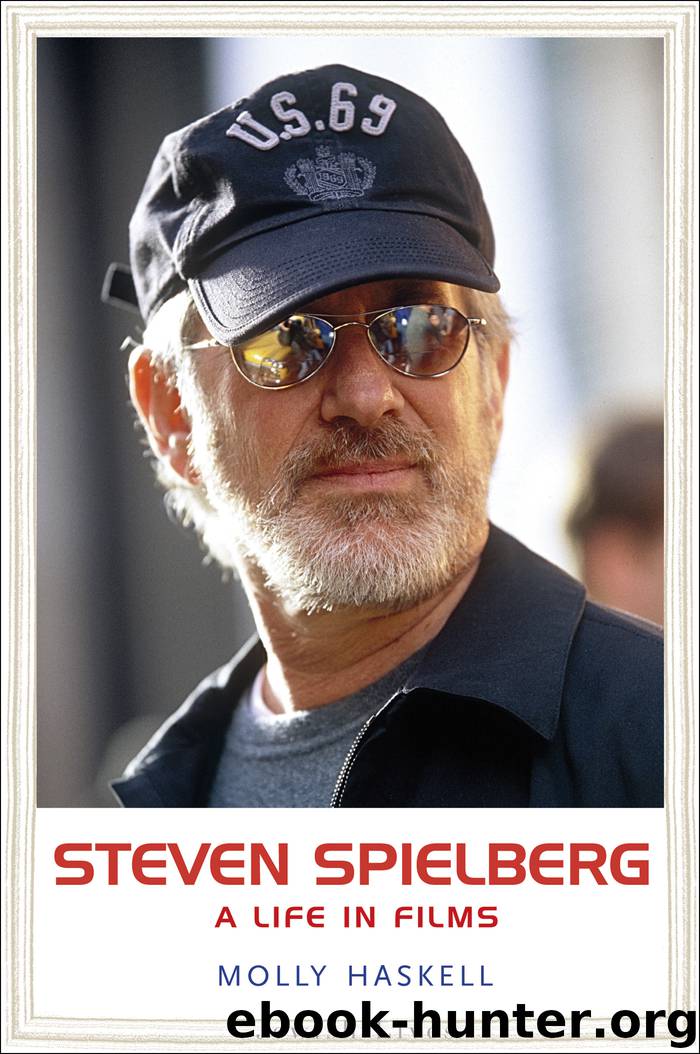Steven Spielberg by Molly Haskell

Author:Molly Haskell [Haskell, Molly]
Language: eng
Format: epub
ISBN: 9780300186932
Publisher: Yale University Press
Published: 2017-01-15T07:00:00+00:00
10
Empire of the Sun
SHANGHAI, ON THE EVE of Pearl Harbor. The camera tracks along a muddy river where wreaths of flowers and wooden coffins are carried along by the tide like so much flotsam. The bow of a skiff ploughs heedlessly through the “debris.” The camera pans to a church in the English quarter, where Chinese chauffeurs wax block-long Rolls-Royces and the exquisite strains of a boys choir rise overhead; inside, a boy’s voice—a boy we soon know as Jamie—soars in a solo. After the service, we accompany Jamie to his walled-in mansion in the elegant English compound, and as he enters, the boy stares out the window at a grizzled beggar seated at his gate. The camera continues to chart the coexistence of two cultures, a desperate Chinese population of servants and refugees about to be invaded by the Japanese, and a hundred-year-old British community on the eve of flight or extinction. Motion and emotion have rarely been so expressively joined. Other Spielberg beginnings may be more dazzling, but this one, troubling and beautiful, haunts like a dream of one’s own. The gliding movement of camera and limousine, the hushed interior, the shouts and threats of desperate refugees in the streets: this time the boy is on the inside looking out, but it’s an inside that is no longer safe.
Another Spielberg movie centered on a child, but a movie, and a child, like no other. Empire of the Sun is the film in which a boy’s fantasy of war as aerial glory crash-lands into reality, and overnight he finds himself alone, in a world shorn of all safeguards and security, where he will turn feral in order to survive. It is, in a strong if minority opinion (mine included), Spielberg’s greatest film. Adapted from J. G. Ballard’s semiautobiographical novel, it describes the author’s own adventures as an English child cut adrift from his parents in the great Shanghai evacuation.
David Lean was originally slated to make the film, but he felt the shooting in China would be too strenuous, and in his view the story didn’t have dramatic shape. Spielberg had planned to produce, but when he read the screenplay by Tom Stoppard, he longed to make it himself. Spielberg was immediately attracted to the idea of an adult world as seen through a child’s point of view. It was, he said, the opposite of what had become his “credo: a man discovering things through the child in him.”1
On the page it would seem to be a mismatch: Spielberg the optimist and humanist against one of the bleakest visions in contemporary fiction. J. G. Ballard would embrace, in science fiction, a kind of erotics of violence, his profoundly disillusioned view of humanity stemming from childhood exposure to war and atrocities that are virtually unimaginable, and certainly a stretch for a director who by his own admission had never seen a dead body or suffered real loss. Yet there are dozens of common points, primarily his innate affinity with childhood and
Download
This site does not store any files on its server. We only index and link to content provided by other sites. Please contact the content providers to delete copyright contents if any and email us, we'll remove relevant links or contents immediately.
| Actors & Actresses | Directors |
The Kite Runner by Khaled Hosseini(4502)
Gerald's Game by Stephen King(3941)
The Perils of Being Moderately Famous by Soha Ali Khan(3795)
Dialogue by Robert McKee(3603)
Story: Substance, Structure, Style and the Principles of Screenwriting by Robert McKee(3002)
The 101 Dalmatians by Dodie Smith(2951)
The Pixar Touch by David A. Price(2752)
Confessions of a Video Vixen by Karrine Steffans(2690)
Fantastic Beasts: The Crimes of Grindelwald by J. K. Rowling(2558)
How Music Works by David Byrne(2554)
Slugfest by Reed Tucker(2434)
Harry Potter 4 - Harry Potter and The Goblet of Fire by J.K.Rowling(2426)
The Mental Game of Writing: How to Overcome Obstacles, Stay Creative and Productive, and Free Your Mind for Success by James Scott Bell(2403)
Wildflower by Drew Barrymore(2126)
Scandals of Classic Hollywood: Sex, Deviance, and Drama from the Golden Age of American Cinema by Anne Helen Petersen(2119)
Casting Might-Have-Beens: A Film by Film Directory of Actors Considered for Roles Given to Others by Mell Eila(2078)
Screenplay: The Foundations of Screenwriting by Syd Field(2075)
Robin by Dave Itzkoff(2017)
The Complete H. P. Lovecraft Reader by H.P. Lovecraft(1986)
